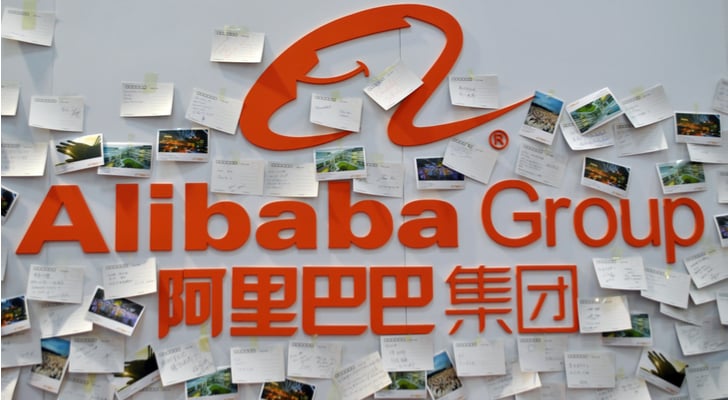I’ve become increasingly cautious on Alibaba Group Holding Ltd (NYSE:BABA) over the past couple of months. Alibaba stock had a torrid 2017, gaining some 96%. But the rally petered out in December, before resuming this year (BABA stock already has gained more than 10%).
It’s been mostly the valuation that’s changed my opinion toward BABA stock. There’s obviously a wonderful story here from an investment standpoint. The Chinese market is going to grow for years, if not decades.
Alibaba has built out businesses well beyond e-commerce, including a cloud services offering. I liked Alibaba stock a year ago, even correctly predicting that BABA stock would hit an all-time high in 2017.
Since then, however, BABA has added over $200 billion in market capitalization – enough to buy Toyota Motor Corp (ADR) (NYSE:TM). And there are risks here. The long-running accounting concerns about BABA stock Ian Bezek detailed on this site last year aren’t going away.
The Chinese state still is run by a single-party Communist government, as ‘business-friendly’ as they appear to be to the West.
At this valuation, I don’t think China is enough – as attractive as that market will be. Alibaba needs to become a truly global player – but that looks like it might not be as likely as investors (myself included) thought. If that’s the case, then the hopes for BABA stock to rise – let alone hit the trillion-dollar valuation mark – probably are too optimistic.
Ant Financial-MoneyGram and BABA Stock
From a fundamental perspective, the termination of the merger between Alibaba subsidiary Ant Financial and Moneygram International Inc (NASDAQ:MGI) shouldn’t matter to Alibaba stock. The merger, agreed to after a bidding war with Euronet Worldwide, Inc. (NASDAQ:EEFT), was only valued at about $1.2 billion.
Even assuming Alibaba was receiving a 100% return on its investment, the deal would have boosted the value of BABA stock by about 0.3%.
But the termination of the deal highlights a key issue here: this still is a Chinese company. And while that economy is growing, and the country’s markets are normalizing, there’s still two impacts that need to be considered here.
The first is that there’s an extra amount of risk that needs to be discounted into the Alibaba stock price. Alibaba shareholders, as Bezek pointed out, don’t even own a piece of the actual company
. Chinese law forbids direct ownership, so BABA stockholders own a piece of a Cayman Islands-based company that receives a share of the company’s overall profits. The accuracy of China’s macro numbers long has been questioned. And at some point, a correction in that economy seems likely after a 25-year-plus expansion.
The second is that being a Chinese company is a huge benefit for Alibaba in-country – and a huge problem elsewhere. The end of the MoneyGram merger, spurred by the US government rejecting the deal, is just one example. Alibaba has clear goals to expand its cloud business beyond China – but long-running concerns about Chinese tech vendors could stunt that growth, particularly outside of Asia.
Can China Alone Support Alibaba Stock?
On their own, those risks don’t doom Alibaba stock. Some Chinese issues are worth the risk: I continue to recommend Alibaba rival JD.com Inc(ADR) (NASDAQ:JD), for instance. While Alibaba may face an uphill climb outside of China, its oft-cited corollary, Amazon.com, Inc. (NASDAQ:AMZN), will face similar struggles in much of Asia.
Still, the Alibaba-Amazon comparison is worth considering. China, and Asia more broadly, might be seen as the future. The region seemingly provides a greater growth opportunity looking forward than the Western markets that drive most of Amazon’s revenue and earnings.
But the Chinese market still is nowhere close to that of the U.S. Current projections suggest that Chinese GDP, even with roughly four times the population, won’t catch up to the American figure until 2028.
The average Chinese citizen has one-third the purchasing power of his or her American counterpart. It’s Amazon whose markets look more attractive – yet that company is valued only about 25% more highly than Alibaba.
Meanwhile, JD.com provides a more formidable rival than anyone facing Amazon. And its valuation, roughly one-eighth that of Alibaba stock, makes it a much more attractive play given the risks.
Again, there is a story worth buying at Alibaba. But price matters. And the 100%+ run since the beginning of 2017 makes that price looks a bit more stretched. A forward P/E of 28x might not sound that high. That multiple, however includes all the risks inherent in the stock.
In that context, BABA stock isn’t quite as attractive, particularly if its share in Western markets remains limited. Right now, that seems like it very well could be the case. And that could keep a ceiling on Alibaba stock going forward.
As of this writing, Vince Martin has no positions in any securities mentioned.

